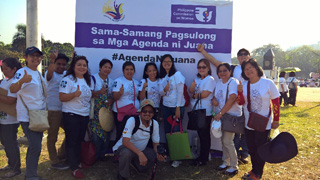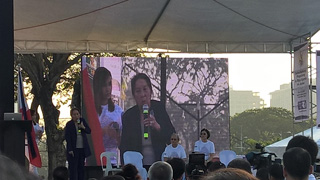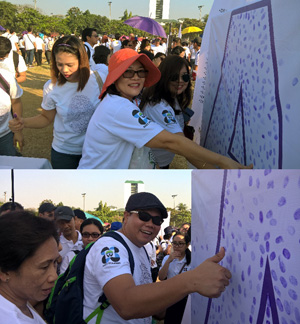 The Philippine Council for Agriculture, Aquatic and Natural Resources Research and Development of the Department of Science and Technology (DOST-PCAARRD) joined the Philippine Commission on Women (PCW), other government agencies, and civil society groups in the advocacy event themed, Sama-samang Pagsulong sa mga Agenda ni Juana.
The Philippine Council for Agriculture, Aquatic and Natural Resources Research and Development of the Department of Science and Technology (DOST-PCAARRD) joined the Philippine Commission on Women (PCW), other government agencies, and civil society groups in the advocacy event themed, Sama-samang Pagsulong sa mga Agenda ni Juana.
The event was a call to include women’s concerns in the platforms and development agenda of political candidates seeking public office.
Participants flocked together at the Quirino Grandstand, Rizal Park Manila and cast their ballots on priority agenda that the next administration should address.
In a keynote speech, UP Economics Professor, veteran women’s rights advocate, TV host, and newspaper columnist Winnie Monsod cited, among others, the importance of further reducing the gap between women and men on economic participation, education, and political empowerment. Currently, the Philippines ranks 7th out of 145 countries in terms of closing the gender gap. The Philippines Global Gender Gap Index (GGGI) of 0.790 implies a narrow disparity between men and women in terms of economic, educational, health-based, and political indicators.
Monsod cited the importance of women’s contributions in the economy. “Women contribute an average of 39% in the country’s Gross Domestic Product (GDP) from 2000-2009 as cited by the Philippine Statistics Authority. This percentage does not include unpaid housework services,” Monsod said, when unpaid housework services were accounted for, statistics show a 5% increase in the women’s share in GDP.
 During the event, PCW executive director Emmeline Versoza explained the women’s five general agenda such as economic empowerment; social development; security, justice, and peace; climate change and disaster risk reduction; and gender-responsive governance.
During the event, PCW executive director Emmeline Versoza explained the women’s five general agenda such as economic empowerment; social development; security, justice, and peace; climate change and disaster risk reduction; and gender-responsive governance.
Under economic empowerment is the need to improve access to land, water, capital, markets, and enterprise technologies in rural and urban areas; the need to improve gender-responsiveness of business and trade policies; and the need to improve protective and welfare assistance to distressed female migrant workers.

Moreover, men and women would like the next administration to include in their platforms security, justice and peace for communities, vulnerable groups, and individuals especially women and girls with disabilities.
A more pressing and timely agenda is the need to improve education, awareness-raising and women participation in gender responsive climate change adaptation and disaster risk reduction and management and the provision of women and child-friendly spaces in evacuation centers.
The last agenda on gender-responsive governance includes increasing women’ s participation and leadership; more positive portrayal of women in all forms of media; proper utilization of the Gender and Development budget; improved information dissemination; and enactment of laws on women empowerment and gender equality.
These agenda were identified by PCW and further supported by all participants of the advocacy event through a ceremonial affixing of their thumb marks on the wall of agenda.
